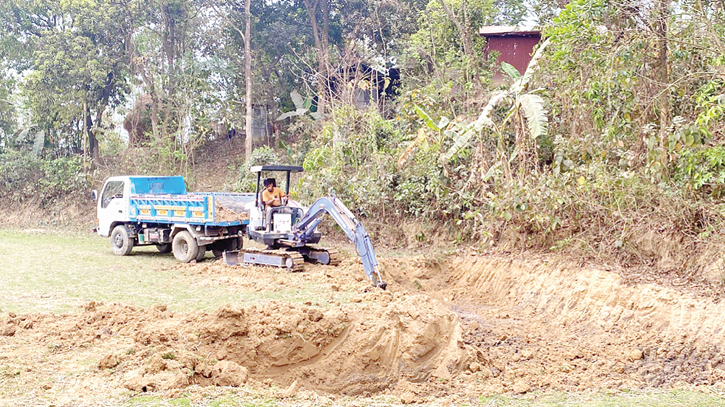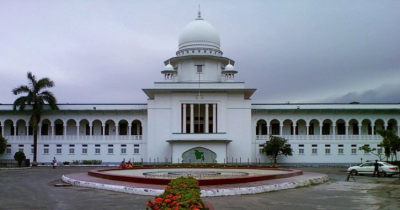
Caption: Illegal soil digging continues in hills and farmlands in Rangunia of Chattogram. Photo: Messenger
Illegal soil cutting from hills and agricultural lands poses a significant threat to the environment and the livelihoods of people in Rangunia Upazila of Chattogram. Despite the administration's efforts to curb this activity, it appears to persist unabated.
The syndicate behind this illegal activity operates with impunity, leveraging the influence of political party leaders to evade the administration's attempts at intervention. Despite raids and fines, the practice continues unabated, highlighting the complex web of power and corruption that underpins this environmental degradation.
The syndicate's operations are extensive, with soil being excavated from around 20 spots in the upazila for various purposes, including brick kilns, gutters, and land filling. The modus operandi involves a group of 8 to 10 people working under the cover of darkness, using advanced excavation equipment to quickly extract soil from both hills and agricultural lands. The land grabbers employ a range of tactics to evade detection and capture, including bribing local authorities and setting up informants to warn them of impending raids.
The consequences of this soil cutting are dire for the environment and local communities. The destruction of hills and agricultural lands disrupts the natural balance, threatens biodiversity, and undermines the livelihoods of local farmers. The use of heavy machinery to extract soil also contributes to noise pollution and damages local infrastructure.
The administration's efforts to combat this issue have been met with limited success. While mobile courts and fines have been imposed, the syndicate has shown resilience, adapting its tactics to evade capture and continuing its operations with impunity. The involvement of influential political figures has made it challenging for the administration to take decisive action against the perpetrators.
The UNO's statement underscores the administration's commitment to addressing the issue but also highlights the challenges they face in doing so. The inability to arrest anyone despite efforts suggests that the syndicate operates with a level of protection that makes it difficult for the administration to act effectively.
The situation in Rangunia Upazila underscores the need for a comprehensive approach to addressing environmental degradation. This should include strengthening the administration's capacity to enforce environmental laws, increasing transparency and accountability in governance, and engaging with local communities to build support for conservation efforts.
Moreover, the involvement of political party leaders in these illegal activities underscores the need for political will and commitment to environmental protection. There must be a recognition that the long-term sustainability of the environment and the well-being of local communities are non-negotiable and that any form of environmental degradation must be met with swift and decisive action.
The issue of soil cutting in Rangunia Upazila is a complex and challenging problem that requires a multifaceted approach to address. It is a reminder of the urgent need for environmental stewardship and the importance of holding those responsible for environmental degradation accountable.
Messenger/Faria








